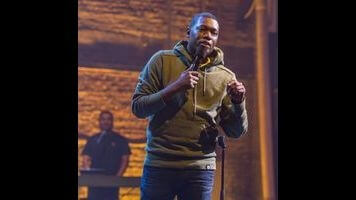One challenge political stand-ups face that apolitical comics don’t is the burden of projecting correctness. Not “political correctness,” but being correct, politically. For someone like Michael Che, co-anchor of Saturday Night Live’s Weekend Update (and, before that, a correspondent on The Daily Show), audiences expect that his takes on current events emerge from a place of authority.
At its best, Michael Che Matters, the comic’s first Netflix special, sees Che playing on his audience members’ expectations and keeping them guessing. Seth Meyers, who used to have Che’s SNL job, is said to have coined the term “clapter,” an audience’s head-nodding response to a joke that gives them the affirmation they crave. Che doesn’t truck with clapter. In the special (which was filmed back in August), Che prefaces his admission that he likes Donald Trump with, “You’re not gonna like this.” And his audience does not, a chorus of ragged booing greeting Che’s contention that Trump, while he should never be president, “is a real shitty guy, he’s hilarious, and he should be my best friend.” The ensuing bit is hardly Trump-friendly (and Che doesn’t address his controversial SNL hosting appearance), but in his relaxed, prankish manner, Che pricks at his audience’s complacent anticipation and has fun both at its and Trump’s expense. It’s a form of comic authority that he marks as uniquely his.
One of Che’s other strengths is analogy. As on Update, where his stand-up style often enlivens the traditional newsreader jokes, Che has a way with absurd yet apt comparison that successfully jumps a joke out of its track. It’s unsurprising, considering the special’s title, that the Black Lives Matter movement takes center stage for a while, and Che’s rebuttal to the reactionary riposte “all lives matter” is knocking out its rhetorical underpinnings: “Really? Semantics?” Che begins, before positing a similar response to a wife asking, “Do you love me?” It does what the best jokes do—get laughs of recognition, despite being a new thought. Genuine, thought-provoking laughter trumps clapter any day.
Che’s cocky but laid-back vibe has, as he admits at one point, gotten him into trouble. Many comics adopt a smug “I’m just telling it like it is” persona to merely push buttons, but Che relates stories of how his brashness carries a healthy vein of open-mindedness. He excuses a woman he’s known for decades for calling him “nigger” during an argument, joking, “She can’t be a racist because she’s got low self-esteem.” For Che, doing comedy means being honest above all things—and being prepared for your honesty to run up against someone else’s truth. Confessing that he used to use the word “tranny,” he muses about why just adding a “y” to something is offensive, then tells how a trans friend asked him, “How would you like it if I called you ‘blackie?’” Che, who’s been accused of homophobia for saying that he’d be sad if he had a gay son, doesn’t abandon his position, instead explaining that he’ll be just as sad if he has to keep penises away from a straight daughter. “You gotta stop accusing people just for being honest,” he states. “That’s a teaching moment. You can school me.”
If Che needs schooling based on what’s present here, it’s with his material on women. Che’s “gotten in trouble” for perceived sexism in the past, his comments about the infamous Harlem catcalling video (and subsequent non-apology apology) suggesting that his principled stance regarding honesty in comedy comes attached to some personal blind spots about male privilege. Here, he calls out catcalling as “the dumbest, most humiliating thing in the world,” but doesn’t find an appreciable follow-up, dodging with jokes about how at least the woman in question could hang onto her video camera for 10 hours in a cleaned-up Harlem, and how hard it is for men to be thought creepy for “trying to compliment a moving target.” Again, the issue isn’t that Che’s comedy should be palatable to everyone, it’s that he doesn’t find his way to something insightful or original when it comes to this subject. His later prediction that Hillary Clinton would win because “white women take whatever the fuck they want” cites Brooklyn’s gentrification as an example, but still smacks of the same facile sexism.
Che commands his stage with deceptive ease throughout the special, leaning on his mic stand and letting his signature unostentatious delivery carry his set. Even when some material isn’t as strong—his biblical jokes run too long without being particularly original—Che can work a crowd. At one point, Che picks out a pair of guys in the audience to bounce jokes off of (Nick the white guy, Paul the Christian guy) and then keeps returning to them—asking if he’s gone too far, getting their reactions, and always calling them by name, as if they’ve become good buddies. (He jokes at the end that they’re all going to the strip club together.) It’s a clever move that creates an intimacy with the audience that keeps Che’s challenging and funny hour-long special buoyant to the end.
